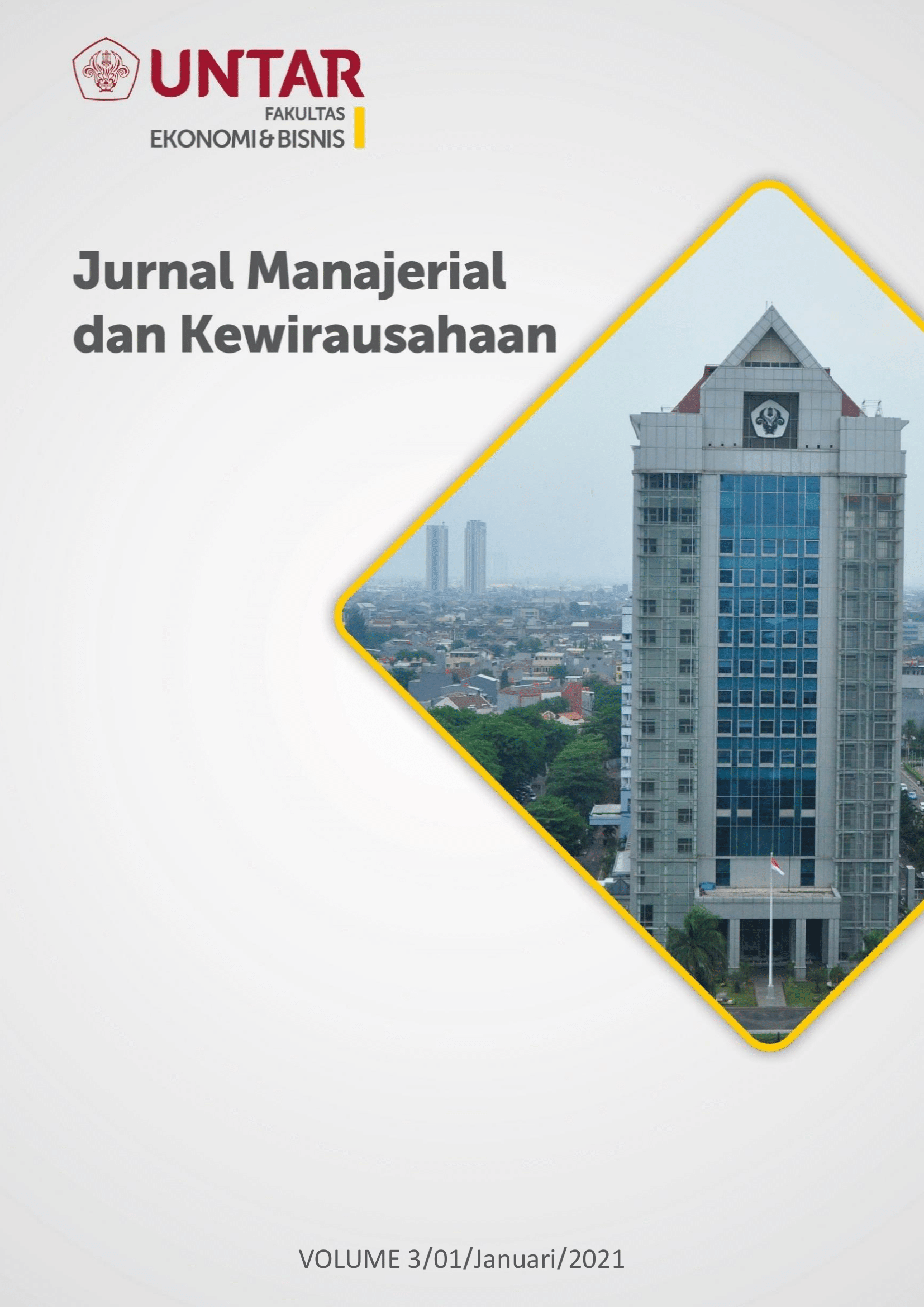Pengaruh Personality Traits Dan Ethical Leadership Terhadap Job Satisfaction Pegawai BCA Kalimalang
Main Article Content
Abstract
This study was conducted with the aim of finding out whether there is an effect of personality traits and ethical leadership on job satisfaction among employees of PT Bank Central Asia’s Kalimalang branch, East Jakarta. The subjects of this study were 50 employees of PT Bank Central Asia’s Kalimalang branch. The sampling method is done by purposive sampling method. This study uses data analysis with the Partial Least Square (PLS) approach in the form of the Smart-PLS application version 3.0. The findings show that personality traits significantly and positively affect job satisfaction. Also, there is a significant and positive effect of ethical leadership on job satisfaction.
Penelitian ini dilakukan dengan tujuan untuk mengetahui apakah terdapat pengaruh personality traits dan ethical leadership terhadap job satisfaction pada pegawai PT Bank Central Asia cabang Kalimalang, Jakarta Timur. Subyek penelitian ini adalah 50 pegawai PT Bank Central Asia cabang Kalimalang, Jakarta Timur. Metode pengambilan sampel dilakukan dengan metode purposive sampling. Penelitian ini menggunakan analisis data dengan pendekatan Partial Least Square (PLS) berupa aplikasi SmartPLS versi 3.0. Temuan menunjukkan bahwa terdapat pengaruh yang positif dan signifikan dari personality traits terhadap job satisfaction. Selain itu, ethical leadership juga turut mempengaruhi secara positif dan signifikan terhadap job satisfaction.
Article Details
Section
This work is licensed under a Jurnal Muara Ilmu Ekonomi dan Bisnis Creative Commons Attribution-ShareAlike 4.0 International License.,/p>
References
Avey, J. B., Wernsing, T. S., & Palanski, M. E. (2012). Exploring the process of ethical leadership: The mediating role of employee voice and psychological ownership. Journal of Business Ethics, 107(1), 21-34. doi:http://dx.doi.org/10.1007/s10551-012-1298-2.
Buble, M., (2012), “Interdependence of Organizational Culture and Leadership Styles in Large Firms”, Journal of Contemporary Management Issues, 17(2), pp: 85-97.
Borgatta, E. (1964). The structure of personality characteristics. Behavioral Sciences, 9 (1), 8-17.
Chandrasekara, W. S., P. (2019). RELATIONSHIP AMONG BIG FIVE PERSONALITY TRAITS, JOB PERFORMANCE & JOB SATISFACTION: A CASE OF SCHOOL TEACHERS IN SRI LANKA. International Journal of Information, Business and Management, 11(2), 219-232. Retrieved from https://search.proquest.com/docview/2184341074?accountid=45753.
Cheng-Liang, Y., & Hwang, M. (2014). Personality traits and simultaneous reciprocal influences between job performance and job satisfaction. Chinese Management Studies, 8(1), 6-26. doi:http://dx.doi.org/10.1108/CMS-09-2011-0079.
Feist, J. & Gregory J. Feist. (2008). Theories of Personality (Edisi Keenam). Yogyakarta: Pustaka Pelajar.
Feist, J., & Feist, G. J. (2009). Theories of personality (7th ed.). New York: McGraw Hill. Greenleaf, R.K. (1977). Servant Leadership: A Journey into the Nature of Legitimate Power and Greatness.
Paulist Press, New York. Guchait, P., Simons, T., & Pasamehmetoglu, A. (2016). Error recovery performance: the impact of leader behavioral integrity and job satisfaction. Cornell Hosp Q 57:150–161. https://doi.org/10.1177/19389 65515 61385 8
Hair, J.F., Sarstedt, M., Ringle, C.M., & Mena, J.A. (2012), “An assessment of the use of partial least squares structural equation modeling in marketing research”, Journal of the Academy of Marketing Science, Vol. 40 No. 3, pp. 414-433.
Haryono, S. (2017). Metode SEM untuk Penelitian Manajemen AMOS LISREL PLS. Jakarta: Luxima Metro Media.
Ko, C., Ma, J., Bartnik, R., Haney, M.H., & Kang, M. (2018). Ethical leadership: an integrative review and future research agenda. Ethics Behav 28:104–132. https://doi.org/10.1080/10508 422.2017.13180 69.
McCrae, R., & Costa, P. (1985). Updating Norman’s “adequate taxonomy”: intelligence and personality dimensions in natural language and in questionnaires. Journal of Personality and Social Psychology, 49 (3), 710-721.
McCrae, R.R. & Costa, P.T. (1997). Personality trait structure as human universal. American Psychologist, 52, 509-516.
Nunnally, J. & Bernstein, I.H. (1994). Psychometric theory (3rd ed.). New York: McGraw-Hill.
Norman, W. (1963). Toward an adequate taxonomy of personality attributes: replicated factor structure in peer nomination personality ratings. Journal of Abnormal and Social Psychology, 66 (6), 574-583.
Nunnally, J.C. (1967), Psychometric Theory, McGraw-Hill, New York, NY. Ramadhani, Naila. (2012). Adaptasi bahasa dan Budaya Inventory Big Five. Jurnal Psikologi Vol. 39 No. 2.
Qing, M., Asif, M., Hussain, A., & Jameel, A. (2019). Exploring the impact of ethical leadership on job satisfaction and organizational commitment in public sector organizations: The mediating role of psychological empowerment. Review of Managerial Science, 1-28. doi:http://dx.doi.org/10.1007/s11846-019-00340-9.
Robbins, S.T. (1996). Perilaku Organisasi, Konsep, Kontroversi dan Aplikasi. Alih Bahasa: Hadyana Pujaatmaka. Edisi Keenam. Penerbit PT.Bhuana Ilmu Populer, Jakarta
Suo, Honggang (2008) A Study On The Relationship Between Personality And Intrinsic Career Success: The Case Of Banking System In Beijing. Masters thesis, USM.
Templer, K. (2012), “Five-factor model of personality and job satisfaction: the importance of agreeableness in a tight and collectivistic Asian society”, Applied Psychology, Vol. 61 No. 1, pp. 114-129.
Tokar, D. M., Subich, L. M. (1997) Relative contribution of congruence and personality dimensions to job satisfaction. Journal of Vocational Behavior. 50 (3), pp.482-491.
Tu, Y., Lu, X., & Yu, Y. (2017). Supervisors' ethical leadership and employee job satisfaction: A social cognitive perspective. Journal of Happiness Studies, 18(1), 229-245. doi:http://dx.doi.org/10.1007/s10902-016-9725-1.
Vijayabanu, C., Amudha, R. (2012) A study on efficacy of employee training: Review of literature. Business: Theory and Practice. 13 (3). pp. 275-282. doi: 10.3846/btp.2012.29.

